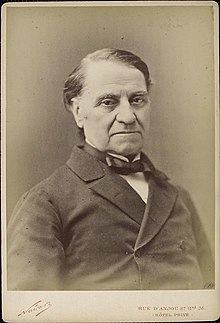Louis Blanc
Blanc's advocacy failed; caught between radical worker tendencies and the National Guard, he was forced into exile.
Blanc returned to France in 1870, shortly before the conclusion of the Franco-Prussian War, where he served as a member of the National Assembly for Seine.
[1] Failing to receive aid from Pozzo di Borgo, his mother's uncle, Louis Blanc studied law in Paris, living in poverty, and became a contributor to various journals.
Under government control the railway system would provide the bulk of the funding needed for this and other projects Blanc saw in the future.
When the workshop program was ratified in the National Assembly, Blanc's chief rival Émile Thomas [fr] was put in control of the project.
What they had received was hand outs and government funded work parties to dig ditches and hard manual labor for meager wages or paid to remain idle.
He protested against the trial and sentence in a series of articles in the Nouveau Monde, a review published in Paris under his direction.
During his stay in Britain, he made use of the unique collection of materials for the revolutionary period preserved at the British Museum to complete his Histoire de la Revolution Française (12 vols., 1847–1862).
As far back as 1839, Louis Blanc had vehemently opposed the idea of a Napoleonic restoration, predicting that it would be "despotism without glory," "the Empire without the Emperor."
He therefore remained in exile until the fall of the Second Empire in September 1870, after which he returned to Paris and served as a private in the National Guard.
Blanc possessed a picturesque and vivid style, and considerable power of research; but the fervour with which he expressed his convictions, while placing him in the first rank of orators, tended to turn his historical writings into political pamphlets.
[5] Blanc resisted what he perceived as the atheism implicit in Hegel, claiming that it corresponded to anarchism in politics and was not an adequate basis for democracy.
[6] Friedrich Engels claimed that "Parisian reformers of the Louis Blanc trend" could only imagine atheists as monsters.
[13] Along with Etienne Cabet, Blanc advocated for what he understood as true Christianity while simultaneously critiquing the religion of Catholic clergy.

